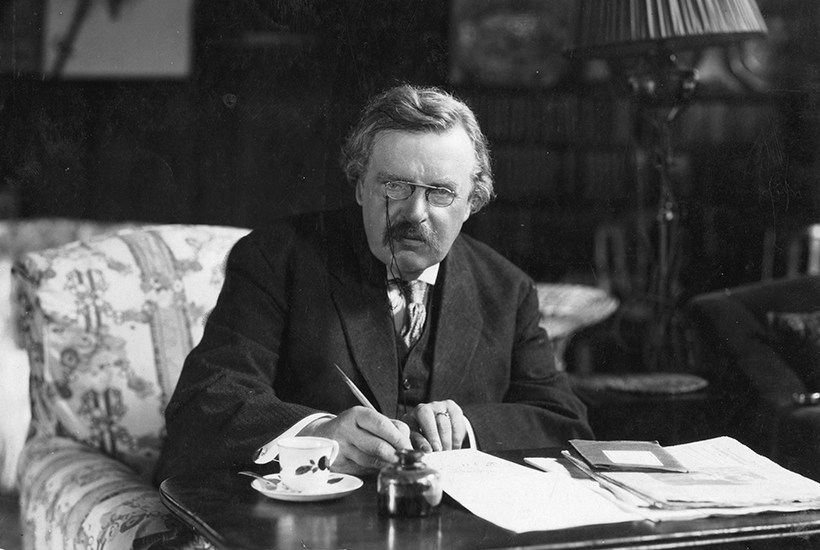In Competition No. 3196, you were invited to supply a reply to the poet from Frances Cornford’s fat woman or Shakespeare’s dark lady. Philip Roe and George Simmers both reminded me that G.K. Chesterton set the bar high with ‘The Fat White Woman Speaks’, his response to Cornford’s triolet (which was also parodied by A.E. Housman). The fat woman clearly moved competitors too (‘It’s always a welcome opportunity to have a go at one of the most unpleasant but mind-worm poems in the English language,’ writes Brian Murdoch; and here’s G.M. Southgate: ‘This poem haunted me… when I was young. It seemed to me so very sad, and cruel too.’) Replies to Cornford significantly outnumbered those to the Bard.
Among those who did give voice to the dark lady, Peter Butler-Way’s suitably bawdy response to Sonnet 151 and Nigel Stuart’s riposte to Sonnet 141 stood out. Others deserving an honourable mention in a large and accomplished postbag are Nick Syrett, C. Paul Evans and Richard Spencer. Those entries printed below nab the prizes this week, earning their authors £25 each.
In mocking me as dark thou speak’st not fair,
In damning me as cruel thou speakest ill;
Why should I not my favours widely share?
For, weak-willed Will, my will loves where it will.
I do not lie — I lie where’er I choose;
Thy spear is not alone that shak’st in me.
And yet, for all thy scorn, I’ll be thy muse
And revel in my immortality.
When ’twixt my sheets, thou art a comedy
Of errors, for i’ faith there’s much ado
For nothing; ’tis not as it liketh me;
The labour of thy love is lost — adieu!
Though thou deniest me honour and a name,
I’ll titles give thee for thy lasting fame.
Nicholas Hodgson
E’er since you told the world my breasts be dun
Your wife has known by whom they’ve been undone.
And she may wonder how far you’ve progressed
With other parts of me which you’ve undressed
As from my eager dark moist lips you sup
To drain the nightly joys of love’s sweet cup,
And in my wiry muff to parse love’s grammar
Which drives thy deep-dipped quill’s insistent clamour.
Yea, dark I be in all my privvy parts
Yet deeper-dark am I in love’s dark arts.
Now of my skills should Anne be sore afeared
And you to her now somewhat less endeared.
Mayhap you should withdraw this latest sonnet,
Else may your marriage end in grief upon it.
Martin Parker
Thou blind fool, Will, to write that Love is blind
And mystifies thy vision, being troubled
By twofold thoughts of me. It is thy mind,
Divided in itself, that has me doubled
As fair and sullied, valentine and whore.
Thus men resolve their inner turbulence
By casuistry, contumacious lore,
High-flown, rhapsodic verse and vain pretence.
As for your heart, whose blessing makes me seem
Ideal albeit blameworthy in truth,
Construe its wild commotion as a dream,
An ague of the sentiments, forsooth,
That racks the sleeping lover till he wakes
And rises healthy for our two selves’ sakes.
Basil Ransome-Davies
You ask why I walk through the fields in gloves?
Missing so much and so much?
Cos I’m burying bags of dismembered remains
Of nosy, sad poets whom nobody loves,
Who go around looking at women from trains
Assuming so much and so much,
Judging their BMI, calling them names,
So mind your own business or be like the bloke who
Sits opposite doing his bloody Sudoku
Or read and stop being a right nosy-poke who
Is dissing so much and so much.
David Silverman
O why do you sit in your first-class seat nursing unmet desires,
while I stroll between lovers you’ll never meet?
O why do you sit in your first-class seat,
when your blood should glow with ungoverned heat
like a locomotive’s fires?
O why do you sit in your first-class seat
nursing unmet desires?
O why do you use such Georgian rhyme
in your haughty triolet?
Your ‘gloves’ and ‘doves’ are prosodic crime.
O why do you use such Georgian rhyme?
Are you trapped in a Cambridge paradigm
under Darwin-Wedgwood sway?
O why do you use such Georgian rhyme
in your haughty triolet?
Nick MacKinnon
Shall I tell you precisely, Ms Cornford — nay, Frances —
Why I walk through the fields thus accoutred?
One has to observe protocol, the nuances
De rigueur when invited to dinners and dances,
One simply conforms under the circumstances,
The reason I’m suited and booted;
Plus my stealth-bomb selection of come-hither glances,
Strategically, coyly computed.
Whereas you and your cohort, Ms Cornford, dear Frances,
(I believe it is commonly mooted)
Don’t indulge in such frivolous, fatuous fancies,
Won’t dip a toe in the water, take chances,
Flirtatiously fend off fine fellows’ advances;
In the ways of the world, so untutored.
Disdainful of random and risqué romances,
You’re tragic, emotionally neutered.
Mike Morrison
No. 3199: I spy
Are we facing a future in which we are spied on not only by Alexa, Siri and Cortana but also by our mattress, our vacuum cleaner, even our children’s toys? You are invited to supply a poem in which an inanimate object comments on its owner’s behaviour. Please email entries of up to 16 lines to lucy@spectator.co.uk by midday on 12 May.
Got something to add? Join the discussion and comment below.
Get 10 issues for just $10
Subscribe to The Spectator Australia today for the next 10 magazine issues, plus full online access, for just $10.
You might disagree with half of it, but you’ll enjoy reading all of it. Try your first month for free, then just $2 a week for the remainder of your first year.














Comments
Don't miss out
Join the conversation with other Spectator Australia readers. Subscribe to leave a comment.
SUBSCRIBEAlready a subscriber? Log in